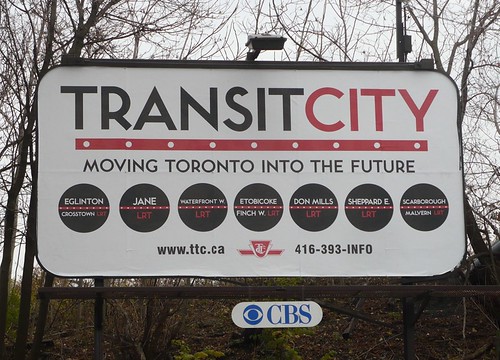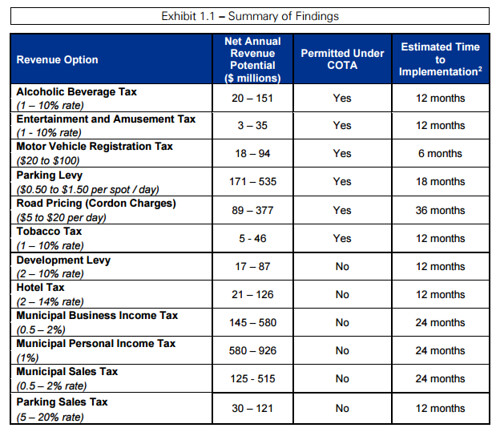Canada update: municipal taxes, transit, and regional planning
1. Toronto transit. Crazy things keep happening with regard to transit expansion planning in Toronto. This has been a problem for a long time. The Transit City proposals for expansion, developed under then Mayor David Miller, which were focused almost exclusively on adding light rail to the mix were junked by his successor, Rob Ford.

Transit City billboard, Toronto, modified to criticize a then Mayoral candidate.
Ford focused primarily on cars and was notorious for getting rid of bike lanes because they took space away from cars but pushed a subway as a transit line replacement for the city-suburb of Scarborough, as a kind of equity issue, not for "the poor" but for "suburbanites" receiving less flashy transit service compared to "over-served" urbanites, even though from a financial and ridership standpoint, heavy rail was the wrong choice.
It's very rare for a transit agenda to make it to an individual campaign sign, as how John Tory's Smart Track proposal was featured on his signs. Photo: Ari Perlin-Bain, Humber News.
That has mucked up the discourse ever since, as Ford's successor John Tory remains committed to a subway connection for Scarborough ("Why I support the Scarborough subway: John Tory," Toronto Star), even though it would be one station and $3+ billion ("One-stop subway plan needs ‘rethink’ with 25 LRT stops possible, critics say," Star) and competes with his separate Smart Track concept ("The Truth About SmartTrack," Torontoist) to bring more frequent and expanded service to the Go Railroad "commuter" lines.
2. Toronto city finances. The City of Toronto is desperate for new revenues to support current activities as well as transit expansion, and the City Council is considering recommendations ("Report puts congestion tax, alcohol tax on Toronto council's radar" and Don't impose parking tax, coalition urges city," Star) for how they may go about doing so (Toronto Revenue Options report, KPMG).

However, Star columnist Royson James, who believes the city does have a need for additional revneues, argues that when elected officials waste limited funds--and the Scarborough subway proposal aims to serve 4,300 new riders/day at a cost significantly greater than building many miles of a many station light rail system--they undercut their case for the need for greater revenues ("Toronto council’s $3 billion choice doesn’t inspire trust").
3. Urban government taxing capacity in Canadian cities. Like the relationship between local jurisdictions and state governments in the United States, Canadian cities act subject to authorization by the provincial legislature, and most cities lack the taxing authority they need to be able to function more successfully in the 21st century, especially as federal and state/provincial governments devolve more responsibilities to local governments.
The Institute on Municipal Finance and Governance at the University of Toronto released a report yesterday, More Tax Sources for Canada’s Largest Cities: Why, What, and How, calling for greater revenue capacity for the country's largest cities. From "Canadian big cities need new revenue sources: experts":
Toronto and other big cities should rely more on revenue tools and less on property tax revenue to pay for municipal services and unfunded capital projects, write two leading municipal finance experts in a new paper.I haven't worked through the report, but I imagine the recommendations are pertinent to cities across the globe. (For example, as part of the UK national government's austerity budget, local government budgets have been crushed--Liverpool's has been reduced by 58%--with the provision of almost zero new revenue sources.)
“Although the challenges have increased over the last few decades, the revenues available to cities to meet those challenges have remained largely the same,” say the authors.
“Other cities around the world use a wider range of tax choices, including income, sales, fuel, and other vehicle taxes. It is time for Canadian cities to have access to some of those choices as well.”
(The claim to fame of the professor of the first poli sci course I took was his work on "taxing capacity" of national governments, and his analysis of North and South Vietnam found that North Vietnam was much more successful in collecting taxes and therefore much more likely to have greater political legitimacy compared to the South, with the edge on winning their War of Liberation. Taxing capacity and realization is an important indicator.)
 4. Planning and Metropolitan Edmonton.
4. Planning and Metropolitan Edmonton.Canada is different from the US in that generally, there is a level of government and planning at what they call the regional scale, not unlike how in many areas of the US there are separate governments for counties and cities, towns, and townships.
But in Canada, the regional government includes elected representatives from the various communities separate from those elected to town councils. Also some cities, in particular Toronto and Montreal, are an amalgamation of the core "historic" center city and former inner ring suburbs.
In Edmonton, the report, BE READY, OR BE LEFT BEHIND by the Advisory Panel on Metro Edmonton’s Future, calls for greater integration and cooperation, and it doesn't pull punches ("Edmonton mayors warned to work together in new report," Metro). From the article:
The capital region needs to work together or risk being left behind and it better not wait. That was the blunt assessment delivered to nine regional mayors, by the expert panel they commissioned last year to study the Edmonton area’s competitveness in a report they released Friday.In these days of people not reading long reports (for example, a study by the World Bank of the number of downloads of its online publications found that many had not been downloaded even once) it's nice to have a very direct title in big type on the cover.
The nine communities involved were Edmonton, St. Albert, Strathcona County, Parkland County, Sturgeon County, Fort Saskatchewan, Spruce Grove, Leduc County and Leduc. ... the report [...] recommends the area look to work together on economic development, land use planning and inter-municipal transit quickly if the city wants to be competitive globally.
Likely this initiative is being driven in part by the oil industry's impact on cities in Alberta. For the past few years, they had been growing like crazy and likely weren't handling it as well as they needed to, at least in Edmonton, likely leading to the creation of the advisory group.
By contrast, Calgary's mayor Naheed Nenshi, is considered to be one of North America's most progressive mayors ("Calgary Mayor makes us look like rednecks" and "'Canada's mayor' sees the city positively," Star), they hired controversial planner Rollin Stanley (he had been the chief planner in Montgomery County, Maryland, brought in to shake things up and help the County develop a more intensified approach to suburbanism in the 21st century) to try to be proactive on land use planning and management of development, and the city opened a light rail line in 1981, and they continue to expand it. Edmonton's light rail opened for service a couple years ago.
But now, as the report is released, the economic circumstances are significantly different--really bad instead of excellent. Now they have to deal with the fallout from the drop in the price of oil on the Albertan economy, and the likelihood of lower oil prices for many years into the future.
Like other oil patch areas, Metro Edmonton jurisdictions are going to have to maximize their shrinking budgets in order to perform well. In the long run, coordination and integration is cheaper and more effective.
5. Vancouver transit. Last year, a referendum to expand funding for transit and transportation investments was defeated by residents of Metropolitan Vancouver in British Columbia. Like a lot of these kinds of transportation fundraising referenda, it was set up to fail, with a hyper short timeline and other issues. While those of us elsewhere in North America think TransLink is managed well, the no campaign made the transit agency out to be inept, and that likely led to the defeat of the plan.
"Yes we need transit, but TransLink sucks so it's better not to tax ourselves for transportation improvements, even though we need them, because they'll be wasted" is the narrative.Vancouver SkyTrain. Ironically, Vancouver uses the same transit technology that was used for Scarborough's RT. In Scarborough the system was allowed to deteriorate and rather than fix it, they'd rather build something else.
It's the same narrative in most places, just as anti-transit advocates push BRT instead of rail and then when that element of their campaign is successful, they continue their anti-transit campaign in a different guise and push back against improved bus service also.
But with the victory of the pro-city Liberal Party in last fall's national election, and part of their platform was increased investment in cities and infrastructure, the federal, provincial and local governments put together a program for transit investment, despite the failed referendum ("Vancouver area to see $740-million in transit improvements over three years," Toronto Globe & Mail). The federal government will pay half the cost.
The monies will pay for new rail cars for Vancouver, planning for three light rail lines in Surrey, a suburban community southeast of the center city with almost 500,000 residents and many colleges, and extension planning for the Broadway rapid transit line in Vancouver.
Labels: municipal finance and budgeting, progressive urban political agenda, public finance and spending, regional economies, regional planning, transportation planning





4 Comments:
I don't think Phoenix is able to do annexation, it's pretty much bounded by existing cities.
Theoretically what could happen would be city-county and city-city mergers.
But while I see movement on mergers of special districts, like school districts as was pushed by Gov. Christie as a way to save money in NJ, we aren't seeing it on city-county and city-city mergers.
(To save money Cook County had a program to facilitate the annexation of unincorporated parts of the county.)
I was reading a piece in the LA Times about a small under 2 sq. mile community and the controversial budget and hiring issues (they just hired an ex- Boeing person to be a city manager, who the councilmember met because his auto repair business was patronized by the now city manager).
It doesn't exactly abut the City of LA, but it is very close. But it abuts other small communities. It should just be merged.
Or Pittsburgh and Allegheny County.
Or my ideal, Baltimore City and Baltimore County (they were demerged in the 1840s).
Etc.
But as we've discussed, you get the suburbanization problem where the core is outvoted by the extant parts. That's a real problem in Toronto. It was for awhile in London (that's why Johnson won two mayoral elections).
wrt the Canadian housing market, hmm.
The issues in Vancouver are very much like the issues in SF, except that in SF, it is not foreigners but tech industry people with extranormal incomes driving up the market, accentuated by the tight supply.
Interestingly, both communities are hyper small physically, about 45 square miles. That makes things a lot worse. (DC has a similar problem, when you take out federally controlled land. But we are built much less densely, and this has a similar but not as pronounced effect on the housing market.)
Even Toronto's issues are less driven, I think, by foreigner purchases.
So the 10 points list seems a little idiosyncratic, but then I could be completely wrong. (E.g., the thing with the Quebec law, comparable to the EB5 program in the US, is that it should be limited to people who not only invest in Quebec, but live there too.)
It's a good list though.
It was an honour to learn something new from you. This is one of the best works of prose ever written. This is one of your better pieces, and I've read a lot of them. Thanks for the inspiration. I appreciate your efforts and ask that you continue them. brampton taxes
How did you come across this treasure trove of information? Keep an eye on the ball. In my opinion, this is an exceptionally well-written and insightful blog post that has a lot to offer.
As much as I admire your initiative, I wish you well in your blogging activities. financial app
Post a Comment
<< Home